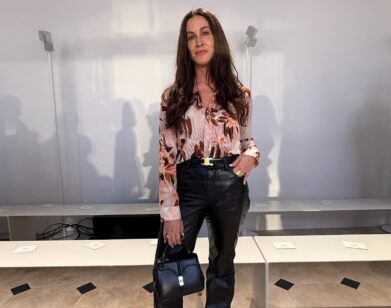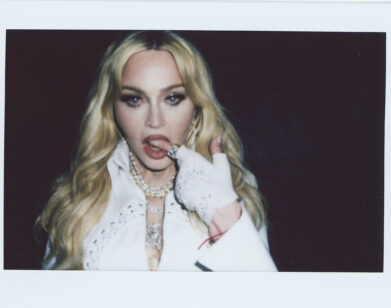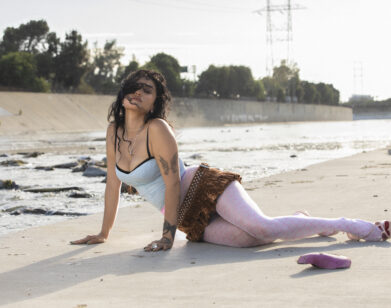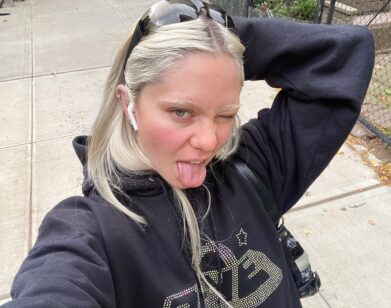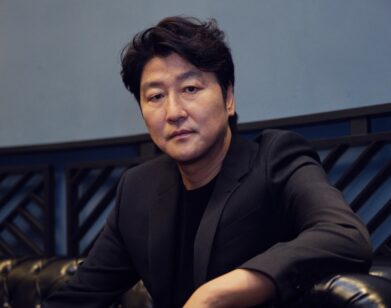Purity Ring Wants to Wrap Themselves (and Us) in Music
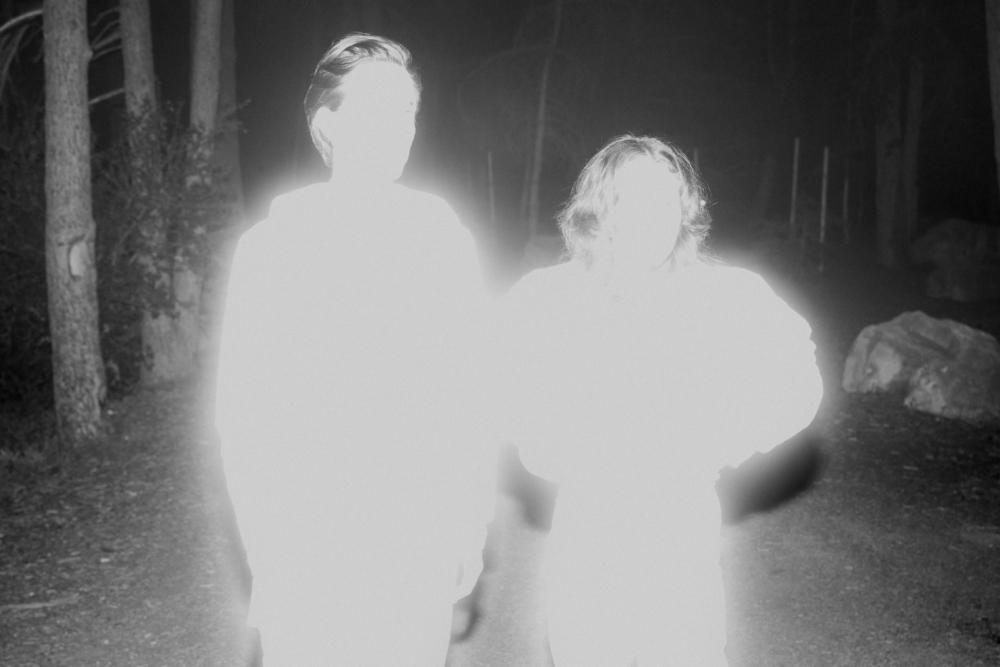
This is “Add to Queue,” our attempt to sort through the cacophony of music floating in the algorithmic atmosphere by consulting the experts themselves. Our favorite musicians tell us about their favorite music—the sad, the happy, the dinner party-y, the songs they want played at their funeral. This time around, we plumb the brains of the dream team behind Purity Ring—Corin Roddick and Megan James—who, after a five year pause, just came back to deliver the comfort-inducing album we desperately need. The sonic landscapes of Womb surround and soothe us lucky listeners; here, producer Roddick and vocalist James list the musical textures that have been cloaking them in turn, from Jewish liturgy to hardcore punk. Cozy up.
–——
BESSIE RUBINSTEIN: How are you both doing?
CORIN RODDICK: Pretty good.
MEGAN JAMES: Good and lonely.
RUBINSTEIN: Who are you listening to to stave off the loneliness? Who are your quarantine repeats?
JAMES: I’ve been listening to a few things. One that I can’t get enough of, kind of blown away by, is Dua Saleh. There’s a new-ish song called “Pretty Kitten”…every time I put it on I’m like, “what the fuck, this is so good.” And every new part that comes in I’m like, the same thing. I’m really excited about that music. It’s been kind of a long time since I felt that way, but something in this makes me feel satisfied.
RODDICK: The past day I’ve been listening to a new song by Rosalía. I don’t speak Spanish, but I was a huge fan of her last album. It was one of my favorite records of the last couple years. So any music from her, I’m always really excited to hear.
RUBINSTEIN: I woke up this morning to a text from my friend telling me to listen. Remember the music video for “Malamente”? I used to squat on the floor of my apartment and watch her clapping in that truck on my TV and think, “a person can be that hot? That’s possible?” And the sound of her voice … if I could ride the wings of her vocal tone away from quarantine I would.
RODDICK: Yes! She has probably some of the best music videos since Björk in the ’90s.
JAMES: Totally. Also, I’ve been listening to a lot of Default Genders. Her last record from 2019—I think she has a new one coming out in like a week too—there’s a lot of common or shared art, but she turns it into something new and beautiful and there’s so many good songs on Main Pop Girl, and covers, and it’s a very highly textured landscape of something I’ve never heard before. So I’m really pumped about her stuff. And then Mew; this year is the 15th anniversary of Mew and the Glass Handed Kites, and it’s a good reminder of the teenage years. What that record did for me and in our community.
RUBINSTEIN: What other music brings you back to your teens?
RODDICK: One of the bands I listened to a lot in my young teens, which I listen to just as much today, is Deftones.
JAMES: Oh, yeah.
RODDICK: I really love Deftones. I can always put on White Pony. It’s interesting how certain music, you kind of move away from as different experiences happen in your life. But Deftones has always been a staple for me. It’s the perfect combination of something that’s undeniably good every time and weirdly timeless. I started listening to Deftones in my twenties, but I feel a lot of things that I would have felt in my youth. It’s like a heavy dream, or something. It’s just beautiful ingredients. Their new records are good, too. They put out a record I think just a couple years ago.
JAMES: Mm-hmm. Oh, and they’re so good live.
JAMES: It feels like you’re listening to music as if you were younger. It’s like, “Whoa, what is this? This is so exciting,” and you don’t get all of that as often in older age. It’s harder to feel. I feel like Deftones brings that back every time.
RUBINSTEIN: So since you didn’t find Deftones until later, what was the earliest music that you wanted to emulate?
RODDICK: My earliest music memory is being obsessed with Alanis Morissette, and Jagged Little Pill came out. I think I probably would have been five or six years old. I remember it so clearly though. I remember when she’d come on the radio I would always want to turn it up and I’d do my best to sing along to the songs. So I think that that’s my earliest memory of really connecting with music, and knowing that music can kind of do something for someone on a personal level. And I’ve been striving for that early Alanis Morissette connection ever since.
JAMES: She’s still just as good. It’s insane.
RODDICK: And then after that I loved Hanson. That was my first album I bought on cassette with my own money. I wore it out. I was obsessed.
JAMES: I have a harder time answering that. I grew up in a very religious household. I’m one of those people that’s always like, “Oh, I missed that music.” Discovering the old things in the later years.
RUBINSTEIN: When you were a child, then, was there music that was making you feel spiritual? Is it different now?
JAMES: I’m not religious at all anymore, so I don’t get the same thing. There wasn’t any sort of religious rock or whatever. I can’t get into that shit. But a lot of people really like it and there’s some good pop songs in there, but it was mostly old, dark hymns. There are hymns that I’ve always loved and always will. When they’re in my head it’s like, for days. They’re really beautiful. It’s not music I get much out of, anyway. It’s fun to sing in a choir, but that’s it.
RUBINSTEIN: I grew up Jewish and I was always thinking, “This is the spookiest stuff ever,” when we sang the songs and now I know that that’s mostly because it was just in the minor key.
JAMES: Ooh, I don’t know if you would have heard, but I have a friend who also grew up Jewish and just remade all these Jewish high holiday songs. It’s all in Hebrew and I have no idea what she’s saying but it’s, so emotional and heavy. The songs are thousands of years old, but they still kind of sound like pop songs sometimes.
RUBINSTEIN: I would love if you can remember her name because I’ve been thinking for years that there are some that are poppy, and there’s others that are begging to be made into these epic dirges and I’ve always wished someone would experiment with them.
JAMES: Yeah, and she’s a woman singing Jewish liturgy. Her project is Alphabet of Wrongdoing. The cover image is lilac-colored, and she’s holding her hands over her face. I’m not Jewish at all, but I can still feel so much emotion and weight in this thing she’s doing. It’s a very good feeling.
RUBINSTEIN: Speaking of good feelings, I wanted to talk about feeling embryonic. Because “womb” implies this feeling of safety and calmness. What music makes you feel like you’re safe, you’re enclosed, and everything is okay?
JAMES: Thank you for noticing that. That’s why we named it Womb. What makes me feel that way? I put on Philip Glass.
RUBINSTEIN: I just saw him perform with his family!
RODDICK: Oh, nice.
JAMES: Wow.
RODDICK: I want to see him. For that feeling, I usually put on Sigur Rós. It’s droney, beautiful sounds. It’s like you can just kind of let it wrap around you.
JAMES: Ooh yeah. It’s a texture and it brings you in.
Bessie: To me, that’s what you two do. Are there other favorite instrumental soundscapes? Do they necessarily have to be non-lyrical?
JAMES: For me it’s not a lot of classical music. It’s hard for me to feel really into most classical music. Too much jollyness. But Philip Glass for piano.
RODDICK: I listen to a lot of film soundtracks. That’s my go-to background music. Film soundtracks are for active listening as well, though. One that stood out to me lately was the soundtrack for The Revenant, which is Ryuichi Sakamoto. He’s incredible.
RUBINSTEIN: Yes. He has a really great remix album too. It’s all these different electronic remixes with Arca and Yves Tumor and artists like that. It’s gritty.
RODDICK: I don’t know if I’ve heard that one—I’ll check it out. But yeah, I do love his deep discography over the last 30-plus years.
RUBINSTEIN: Which makes me ask, do you have a specific moment in a film where you feel like the music has been perfectly deployed? A specific scene?
JAMES: I feel like that all the time. I can’t remember any though.
RODDICK: Yeah. I definitely remember feeling that way a lot of times. I saw a movie recently called Incendies. It had a Radiohead song, right at the beginning, and that’s the last one that stands out to me where I remember being like, “Oh man, this song rules right here, for this scene.” It’s so dark. And it really captured the moment.
JAMES: I was just asking my partner what it was that we recently watched when I was like, “What is the sound, like who made this soundtrack?” I think it was the soundtrack to Memories of Murder, which is like an old Bong Joon-Ho movie, the director of Parasite.
RUBINSTEIN: What are songs you two could go into battle for, songs that you could fight to?
RODDICK: I would say probably something by Converge. I can never go wrong with that. Like, “Concubine.” When I was growing up in Edmonton I would bicycle everywhere and if I needed to get somewhere really fast, in a short period of time, I’d put that song on. There’s just no way to bike slowly when something sounds that intense. That’s a battle song.
RUBINSTEIN: I’m going to end with a really morbid question, related to the end of life instead of the beginning. Would you two be for or against your own music being played at your funeral?
RODDICK: Oh, super against.
RUBINSTEIN: That would kind of be a very off-tone funeral, I could imagine.
JAMES: Do people get buried to music?
RUBINSTEIN: I don’t think so. Not buried to it. But music does play at most funerals. I’m always curious if people will think that they would want to be commemorated by having their final ceremony involve the music they created in life.
RODDICK: Right. I don’t know, I personally never listen to our music after it’s done. So I probably wouldn’t really want to hear it, even if I was dead.
JAMES: Hopefully as a musician you’ve played enough shows that you don’t want to hear your songs ever again.
Listen to Purity Ring’s “Add To Queue” playlist below, and follow Interview on Spotify for more


